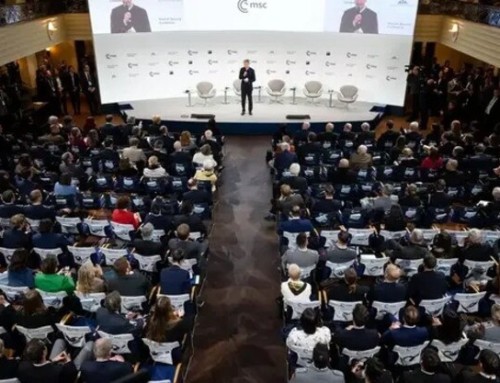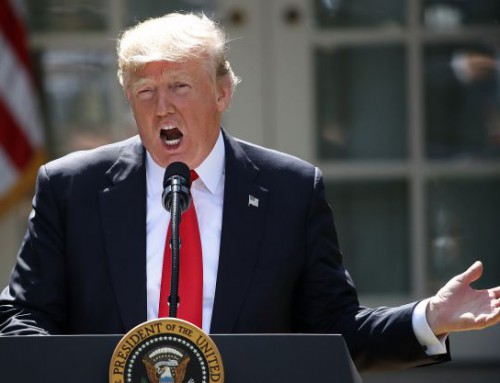GENEVA — Before the Trumpian tirades about “shitholes,” his good relationship with Kim Jong “Little Rocket Man” Un and the waste of money in moving the U.S. Embassy in London from its lofty presence in Grosvenor Square to a largely inaccessible new location south of the Thames, I was going to focus on perhaps the thorniest strategic dilemma of the 21st century: the de-linkage between political and military deterrence.
Because the 20th century was defined by largely binary conflicts — allies versus the central powers in WW I; allies versus the axis in WW II; east versus west in the Cold War and strategic nuclear deterrence — it was assumed that if one side had sufficient military deterrence, i.e. nuclear weapons, political deterrence would follow. That is no longer the case.
Military deterrence has had no effect on Russia’s “active measures” nor on Chinese global expansion or on the intent of Islamist extremists whether Sunni or Shia. New definitions and uses of political deterrence must be created against these types of aggression that are not always dependent on military force as opposed to intimidation and terror. Simply put, tools and means that were successful in the 20th century are often less relevant and effective in the current era.
President Donald Trump consigned that column to a future date. Last week’s outbursts triggered completely polar opposite reactions that crossed partisan lines. To the hard-core base, this was Trump at his best. It was neither inadvertent nor accidental but a premeditative plan for misdirection.
In a single day, the sting from and attention on Michael Wolff’s Fire and Fury were instantly dissolved by the president’s comments no matter how vulgar. To some, immigrants from unsavory and poverty-stricken regions in the Caribbean and Africa were not welcome. Of course, the racist tone when contrasted with immigrants from Norway was unmistakeable.
Moving the embassy in London was indeed ill-advised. As a real estate baron for half a century, Trump’s business experience cast some weight on his reaction. And his embrace of Dear Leader Kim reflected his clever “fire and fury” diplomacy that clearly has changed North Korea‘s hard-line stance about its nuclear ambitions. The contradictory tweets about DACA legislation was, in this supportive view, simply giving the president more maneuvering room in dealing with Congress.
Critics, including Republicans in Congress, were aghast certainly with Trump’s disregard of immigrants from “shitholes” in his unpresidential language, as well as the new relationship with Kim. About DACA, the president’s ambivalence was viewed as his lack of familiarity with the issues and his superficial understanding of policy. But the Kim observation about his “good relationship” was the most perplexing for anyone with any understanding of foreign policy.
When National Security Adviser H.R. McMaster declared North Korea’s nuclear programs were growing more dangerous by the day and hints from the Pentagon suggesting military action and even war were possible, people listened. Now, based on his new view of Kim, more question the president’s mental fitness. How could he switch so dramatically and quickly on North Korea given his prior statements and his purposeful belittlement of Kim?
Reaction abroad was more outraged than in America where the president maintains a loyal base of about a third of voters and virtually none overseas. This was American presidential leadership at its worst. That Trump can believe he has “great relationships” with three of America’s top bete noires — Presidents Vladimir Putin and Xi Jingping and now Kim — is stunning and in direct collision with his own and just released national security strategy. Further, what is the plan and what is the strategy behind these explosive remarks?
As with his recognition of Jerusalem as Israel’s capital, the president received nothing in return other than the thanks of Benjamin Netanyahu and other pro-Israeli supporters. No strategy or plan was apparent to underwrite this unilateral and very unwise decision. But the president seems to respond viscerally and without any consideration of the consequences.
For those anti-Trumpists particularly in the so-called “resistance,” these latest tantrums and outbursts create an opportunity. To defeat the Trump agenda, the president must be isolated from his base. Partisan politics will not help. The more Democrats express anger, the more likely will this congeal presidential support from his base.
The president must be challenged on the basis and rationale of what he says and what he is trying to achieve. Merely criticizing the president as “unfit,” “vulgar,” racist and other epithets will not work. But consistenly and repeatedly questioning his objectives will. The key question: “Mr. President, what are you trying to achieve and why should the American people support you?”






Leave A Comment